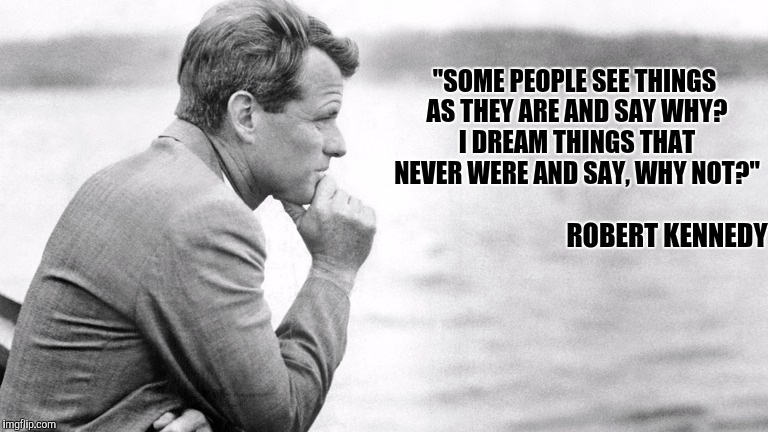Most people, in many countries, are familiar with John Lennon’s song “Imagine”.  Something captivated the listener’s imagination. Imagination can bring us to where we might be from where we are. Lennon was persuading us to imagine collectively, even beyond the nation state. A collective imagination is not a discard of nation states, but a framework for thinking about an international community, rather than warring nation states.
Something captivated the listener’s imagination. Imagination can bring us to where we might be from where we are. Lennon was persuading us to imagine collectively, even beyond the nation state. A collective imagination is not a discard of nation states, but a framework for thinking about an international community, rather than warring nation states.
Of course, becoming an international community is not easy to accomplish, but without thinking about it, how do we achieve it? Imagination is useful. As Robert Kennedy Sr. said “Some people see things as they are and say why? I dream things that never were and say why not?” It does not matter that humanity has not yet matured into an international community. As the creator of Star Trek, Gene Roddenberry said “Humanity is in its adolescence.” With imagination humanity can grow into a young adult.
It does not matter that humanity has not yet matured into an international community. As the creator of Star Trek, Gene Roddenberry said “Humanity is in its adolescence.” With imagination humanity can grow into a young adult.
Steve Jobs, the founder of Apple, once said that he “tried to do for computers what Eichler did for homes.” This was a reference to Joe Eichler, a home developer throughout the San Francisco Bay Area and beyond. My father, John Boyd, was a senior architect for Joe Eichler. They both admired the architect Frank Lloyd Wright and took inspiration from him to imagine subdivisions of homes that worked for common people and families.
I grew up in one these Eichler homes in Palo Alto.

So, if we take what Eichler did for homes and Jobs did for computers, create things that worked for everyone, how do we apply that to our international community so that rights are created that work for everyone?
When Eleanor Roosevelt was asked about what qualities were needed for the creation of the UDHR, she said “imagination and courage.” Following her guidance, Unite asks people to use their imagination to think together about an International Bill of Rights, and the courage to share their thoughts, not to agree on every right, but to agree on some of them.
Too often the discussion about human rights is what rights are we born with? It becomes an endless circle of discussion and those who resist enforceable rights goad others into this discussion. What rights are inherent in being human? The answer is none. We are not born with rights. Yuval Noah Harari, the author of “Sapiens” and recently “Nexus” is correct that human rights are just a story. We are born into societies where they either tell the story of rights, or they don’t. And they either have independent judges to enforce the rights in this story, or they don’t. It’s better if they do.
We are born into societies where they either tell the story of rights, or they don’t. And they either have independent judges to enforce the rights in this story, or they don’t. It’s better if they do.
For many within the human rights community, equating rights with story is blaspheme. They like the story of rights being inherent in human beings so much that they like to assume it as a given. So, if we just repeat the story, or write out the list of rights enough times, they will develop and become enforceable: it has not worked. For the most part the UDHR was an unenforceable document when it was created, and it has remained so.
Please understand that I like the story of the UDHR, and the story of rights for all. I’ve spent one half of my legal career, much of it pro-bono, doing what I can to further the enforcement of rights in the UDHR. The basic principles in the UDHR have helped create rights in some nations. I’m glad to have children in all countries taught the story that there are rights we all have, and share, but it cannot stop there — we need to enhance the story into what Malcolm Gladwell, in his book “The Revenge of the Tipping Point” calls the “overstory.” What humanity needs is a sweeping overstory and Unite for Rights provides one – from its logo to its International Bill of Rights document, and a map showing locations for an international court system.
What humanity needs is a sweeping overstory and Unite for Rights provides one – from its logo to its International Bill of Rights document, and a map showing locations for an international court system.
The mistake since the UDHR was created in 1948 is that our judicial enforcement institutions have lagged too far behind our proclamations about rights. It’s important to recognize and celebrate the many proclamations of rights over the years, they have created important norms, but we should equally and forcefully move to the next step, judicial enforcement of those norms. This is the story we need to tell; it’s the story of Unite for Rights.
The stories we tell create the lives that we lead.
It does not weaken the story of rights to admit that it is a story. It actually strengthens rights to untether them from the story of natural law. As long as people are willing to tell a story of a right to free speech, or a right to education, or a prohibition on racial or gender discrimination, and to demand that those right are enforceable against those who they let govern, that’s the point where a right becomes “fully realized” in accordance with Article 28 of the UDHR.
To secure rights for all, we need not prove that we are born with them. All we need to do is muster enough people to demand rights, and then use our ability to read and write to put those rights in a written International Bill of Rights. With an International Bill of Rights in hand, we make it a quid pro quo for those who govern – then create Courts with independent Judges to ensure that leaders keep their part of the deal.
There will always be authoritarians who will try and seize power for themselves. This is foreseeable. Given this truth, it is essential for humanity to develop what Harari calls a “self-correcting mechanism”: An International Bill of Rights is a self-correcting mechanism for our social contract, our agreement between those who govern, and those who are governed. At the moment those in power try to abuse the limited power we give them, cases can be brought in court to stop them. As we transition to an international community, we can create judicial institutions to restrain authoritarians so that the rest of us do not suffer their abuse.
Given humanity as it is, the UDHR is the best blueprint, created by people of free will, for the world as it can be. Now it’s time to use our imagination to change the story and make the UDHR, with some new rights such as environmental rights, enforceable. It’s a story that, like an Eichler, creates something that works for all.


Leave a Reply